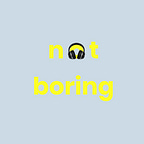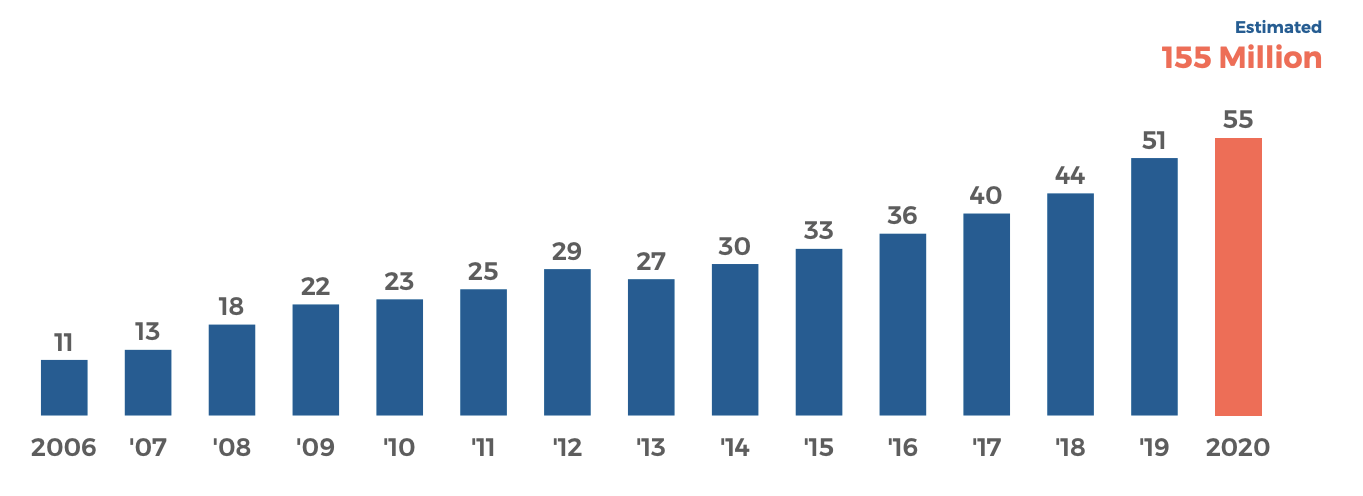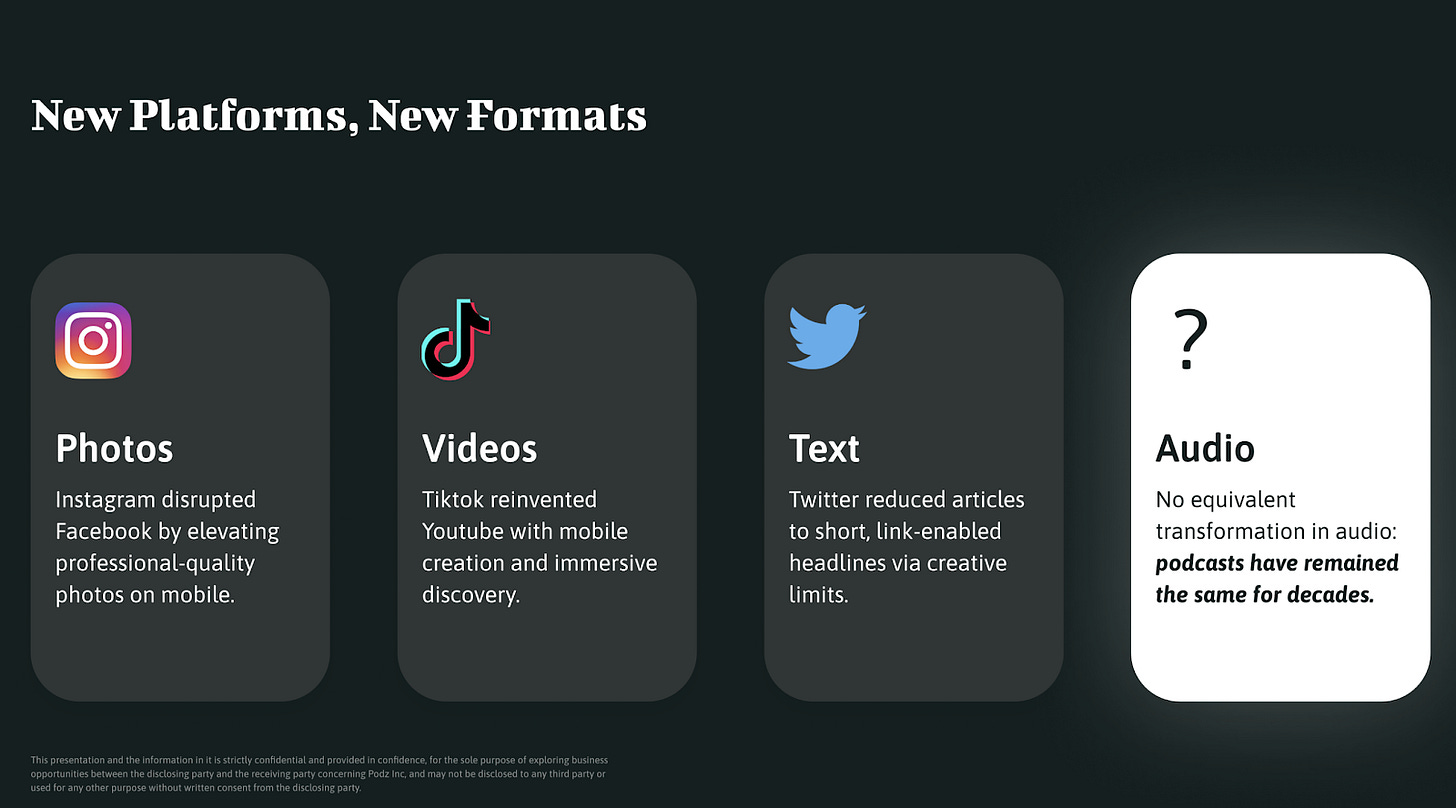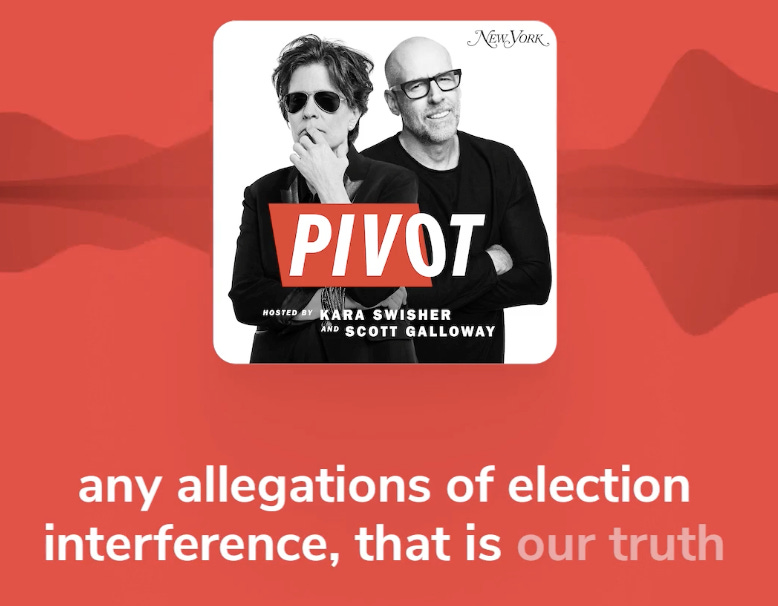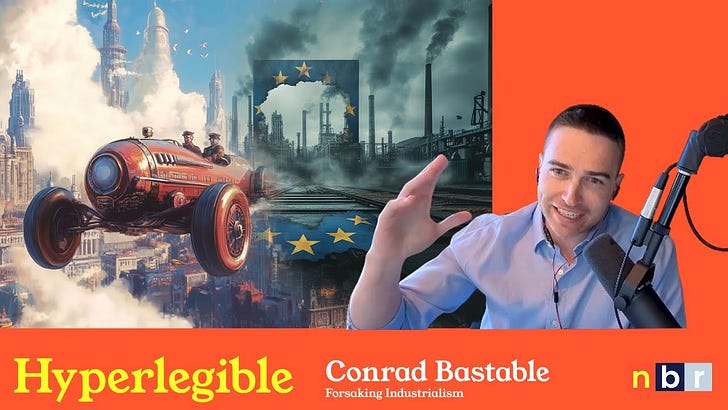Welcome to the 520 newly Not Boring people who have joined us since Monday! If you aren’t subscribed, join 31,634 smart, curious folks by subscribing here:
🎧 Listen to my interview with Podz CEO Doug Imbruce on Podz
Hi friends 👋 ,
Happy Thursday!
Every week, I record an audio edition of Not Boring. Typically the morning of the newsletter, I wake up at 5:30am, head to the basement, record, edit, pick music for, and publish a version of the essay that I read out loud. I have a face for radio and a voice for Twitter, but I like doing the audio version because it lets me give you another way to consume these essays that I spend so much time on.
Thing is, while anywhere between 30k - 100k people read each essay (thanks for sharing!), about 1,500 max listen to the audio version, despite the relative ease of consumption. A big part of the reason for the delta? Podcast discovery sucks.
Today, I’m writing about Podz, a company whose product I believe has the potential to change that. This is the first time I’ve written a deep dive about a consumer social product - all of the rest have been fintech or investing-adjacent - because I assume that if you’re the kind of person who takes the time to read Not Boring once or twice a week, you want to learn new things. I think Podz is going to make it a lot easier to find new audio content on the subjects you want to learn about, and make it easier for the people who, like me, spend hours behind a microphone recording.
Podz only ask out of this is that you try the Podz Beta:
And fill out this survey with your feedback:
To encourage you to give feedback, Doug has generously offered to donate $10 to the charity of my choice for every Not Boring reader who fills it out. I chose Alzheimer’s Foundation of America, because my grandmother suffered from Alzheimer’s, and to me, one of the best parts of audio is that it captures and preserves memory.
I’m excited about this one. Let’s get to it.
Podz & The Future of Audio
Getting on Audio’s Wavelength
I have heard the future of audio, and no, this isn’t another Clubhouse piece. I’m talking about Podz. Its solution, ten years in the making, has a legitimate shot at solving audio’s biggest challenge.
It’s bizarre that the social audio opportunity is still up for grabs. Talking is the oldest form of communication, but while text-, photo-, and video-based consumer social each have both casual and quality winners, audio just joined the party in 2020. Clubhouse has taken the lead in casual social audio, but Podz is going after what I think may be the bigger prize: building the quality social audio feed that surfaces the best content we humans create with our voices.
In April, I wrote one of my first Not Boring essays, Wackos and ZoomGlüts, in which I used an old episode of Hey Arnold to explain why, at the same time:
It was so hard for podcasts and virtual events to stand out, and
The buzziest startup around was one that combined podcasts and virtual events.
I was talking, of course, about Clubhouse, the drop-in audio chat app that launched in March.
It seemed crazy then. At the beginning of the quarantine, any brand, community, or family with a Zoom connection was hosting free events. Zoom fatigue set in fast and hard. Meanwhile, I wrote, “At a time when podcast listening is down by 25%, Amazon sold out of podcast mics. Production is increasing even while demand plummets.”
No commute meant less time to listen to podcasts, but more time stuck inside and more uncertainty about job prospects meant more people wanted to try their hand at making podcasts, hence a podcast supply glut. Our earholes weren’t wide enough to let everything in.
Clubhouse cut through the noise. By limiting invitations to a small group of tech Twitter illuminati, it manufactured exclusivity at a time when every other organization on earth was begging people to come to their free online event/happy hour/conversation/panel.
“While everyone else is begging ‘please!,’” I wrote, “Clubhouse is telling them ‘no.’ It’s the one velvet rope in a world of two-for-one happy hours hawked by overeager promoters.”
It worked. In May, Clubhouse announced a $12 million, a16z-led Series A that valued the company at $100 million. The company was still in beta, had a couple thousand users, and no revenue. Thinkpeople were flummoxed.
But here we are, nine months and eight decades’ worth of quarantine later, and Clubhouse just raised a fresh $100 million Series B, once again led by a16z, this time valuing the business at $1 billion. This time, out of beta, with 2 million users, and plans for creator-focused revenue generation, people get it.

Clubhouse’s success is remarkable, but it isn’t unique in the world of audio. In fact, after an early-pandemic dip, podcasts have come roaring back. Listening is up dramatically, all of the usual suspects are spending hundreds of millions on content, and more people are recording themselves talking than ever before.
Despite that, spoken-word audio is in the early innings of digitalization and monetization:
Podcast ad revenue is projected to grow 10x faster than the next closest medium over the next five years, and even then, it will bring in less than 10% of what radio does.
A tiny minority of podcasters take home the vast majority of the listens and dollars.
Clubhouse and Twitter Spaces are pushing audio-only public conversations forward.
Companies like Otter and Descript are making it easier than ever to capture and transcribe all sorts of conversations.
And still, spoken word audio discovery is an absolute disaster. It’s one of the things holding podcasts back.
That’s what Podz is working to fix, and the product is magical. Podz uses machine learning to pull the best clips from podcasts and deliver them to listeners in personalized feeds. Whenever you hear “machine learning” or “AI,” you should be skeptical, and I was too, until Podz sent me three clips of my own podcast. It picked highlights better than I could myself, pulling out the thesis from each (here, here, and here). It was so good that I thought the team had done it manually and e-mailed the founder and CEO, Doug Imbruce to confirm:
I think that Podz, which is launching its beta today, has the chance to be something special. Like the Clubhouse founders, the Podz team has been working on social products together for over a decade, and like Clubhouse, it’s building a product that stands out in a sea of audio. The first iteration of the product, like a TikTok feed for audio, solves a challenging podcast discovery problem. The underlying tech has the potential to transform audio consumption far beyond podcasts.
Most of the sponsored posts I write focus mainly on the sponsor company, but Doug asked me to write up my views on audio more generally, and to help think through how Podz fits into the audio landscape. That fits with Podz’ (is there an s after the ’ if the word ends in z?) ethos.
The team realizes it’s going after one of the few remaining large untapped opportunities in social, and that it needs to continually improve the product to capture the prize. In fact, Podz’ (going with it) big ask from all of you is to fill out a survey to help the team improve Podz. Download the Podz app here (iPhone only):
Then complete the survey:
Today’s deep dive won’t be like the others. We’re going to go deep down the earhole to cover:
The State of Audio in 2021.
Audio’s Challenges.
Casual and Quality Winners.
Podz and Human-Machine Pairs.
The Opportunitiez for Podz.
Podz is the best solution I’ve seen to one of the hairiest, longest-standing challenges in tech: audio discovery.
The State of Audio in 2021
Note: to keep things simple, when we talk about audio, we’re talking about audio other than music unless otherwise stated.
After a rough start, 2020 turned out to be a fantastic year for podcasts. Remember that chart from a couple minutes ago? The one where podcasts fell off a cliff?
Turns out, that was a blip, a short pause in a line that otherwise climbed up and to the right. According to Chartable, podcast downloads of the 13,000 shows it tracks increased by 189% between January and the end of October.
This isn’t a new trend. In May 2019, a16z, who’s, like, obsessed with audio…
… wrote an in-depth report on the state of podcasting, called Investing in the Podcast Ecosystem in 2019. It’s a couple of years old now, but it’s worth reading for a deeper dive into podcasting’s history and landscape. In the report, a16z used data from Edison Research and Triton Digital to point out that, for the first time, more than half of Americans over the age of 12 had listened to a podcast. Edison and Triton’s 2020 Infinite Dial report showed that number continuing to grow.
As of March 2020, 155 million Americans have ever listened to a podcast. 104 million people listened monthly and 68 million listened weekly, and those weekly listeners listened to an average of six podcasts for an average total of 6 hours 39 minutes per week.
That sounds like a lot, but the average American listens to the radio for 11.9 hours and watches 28 hours of TV per week.
Podcasts also severely lag radio and TV in terms of monetization, which speaks to the opportunity in front of the industry.
The global radio advertising industry is a $35 billion industry. Based on the earnings of the top 10 radio stations in the US, spoken word radio stations (news/sports) account for 57% of revenues. Applying that same percentage to the overall market, spoken word audio advertising is a $20 billion market before applying any sophisticated data or targeting.
Worldwide TV ad spend is five times larger than radio, coming in at $166 billion in 2019.
By contrast, podcasting is still tiny. PWC estimates $812 million in podcast ad revenue globally for 2020, but projects that that number will grow at a 22% CAGR through 2024, at which point it expects the industry to generate $1.7 billion in ad revenue.
Today, time and ad money spent on podcasts is smaller but faster-growing than radio and TV.
One of the main reasons for podcasts’ growth has been that it’s just easier and better to listen to audio on-the-go.AirPods, and AirPods Pro, have been a game-changer for the industry. Sales have nearly 6x’ed since their first year on market in 2017, and if this growth keeps up, they will be Apple’s third-largest product line by revenue next year.
AirPods, and high-quality wireless headphones more broadly, make it easy for anyone to listen to podcasts during whatever they’re doing. Unlike TV, which requires most of your attention, you can listen to podcasts while doing pretty much anything else -- working, working out, cooking, cleaning, falling asleep, commuting, or scrolling Twitter.
The biggest tech and media companies recognize the opportunity in podcasting and have been aggressively buying up tech and content plays in the space. Spotify is leading the charge, but Amazon, Twitter, and Apple, on the tech side, and The New York Times, Sirius XM, and iHeartMedia on the media side, have acquired companies in the space over the past year.
In Earshare: The Idiot’s Guide to Investing in Spotify, I wrote that Spotify, which had been lagging, would turn around when investors woke up to the moves they were making in podcasting, and the positive impact podcasts could have on margins. The day I sent the piece out, March 2nd, Spotify was trading at $139. On May 19th, its price spiked when it announced the Joe Rogan deal. Now, ten months later, it’s trading at $330, up 137%.
Spotify’s market cap has increased by $35 billion since I wrote that. If half of that growth is related to podcasting, it means that Spotify has added 17x more market cap due to podcasting than the total ad revenue the industry is expected to generate globally this year. The market, like the acquirers, is betting on the future of audio.
The supply side is exploding, too. When a16z released its report in 2019, it cited Podcast Insights’ report that there were over 700k podcasts. Two years later, Podcast Insights pegs that number at 1.75 million, and Spotify said that it hosts 1.9 million shows. Spotify’s recent acquisition, Anchor, a podcast creation platform, may have something to do with that. Spotify recently said that Anchor powers 80% of its new podcasts, and 70% of the total catalog. More than half of the podcasts on Spotify, 1 million out of 1.9 million, launched in 2020 alone.
And that’s just podcasting. In under a year, Clubhouse has grown to 2 million monthly users who listen to live conversations in the app. Twitter acquired Squads and Breaker to help it build a Clubhouse competitor, Spaces, which is currently in limited beta. More live conversations mean more competition for earshare, but make it difficult to keep up. On paper, I’m the target Clubhouse/Spaces persona, but between writing and a baby, I spend almost no time participating.
As more of our conversations move online -- into Clubhouse, Twitter Spaces, Zoom, Discord, Fortnite, Teamflow, and other digital environments -- the potential amount of recorded audio has exploded. Products like Otter, Fireflies, and Descript can capture and transcribe that audio, and make it editable and searchable. Anchor itself added a feature in April that allows people to turn Zooms, Meets, and other video chats into podcasts. On Invest Like the Best in 2019, Spotify CEO Daniel Ek said that Spotify releases many of its meetings and townhalls as internal podcasts. Given the ease of listening highlighted above, other companies might follow suit.
All told, after a bumpy start, 2020 turned out to be audio’s best year yet. But the explosion in new content creates new challenges.
Audio’s Challenges
Podcast discovery sucks. It always has, and doubling the number of podcasts only exacerbated the problem.
If you’re old, like me, you’ll remember what the internet was like before Google. You either needed to know exactly which website you wanted to visit and its domain, or you relied on portals like AOL or Yahoo! to tell you which websites you should check out based on some rough categorizations.
That’s where podcasting is today. Maybe a friend told you about a new podcast and you can search for it directly in your favorite podcast player. Or, you can check out Apple Podcasts’ top lists to find one of the thousands of murder podcasts. But there’s no great way to discover and sample new podcasts, no recommendation engines that tell you what you might like based on what you’ve listened to before, and no easy way for any of the million new podcasts to get discovered.
That’s a pain point anyone who’s tried to find a good new podcast can identify with, and the numbers back it up. Axios published a piece on Monday, The podcast business is booming, but few are making money, in which they included this chart:
The top 1% of podcasts get 35k or more downloads per episode, but even the top 20% only get 1k downloads. The median is 124. You can’t make money on 124 downloads.
The article quotes Agnes Kozera, co-founder of Podcorn, a podcast sponsorships marketplace, who points out that, "By default, it is more difficult for podcasters to break out and go viral because the podcast ecosystem doesn’t have a platform with characteristics of a community like YouTube, Instagram or TikTok.”
When I look at the podcasting industry, and the audio landscape more broadly, I see entropy (I know you scientists out there are going to tell me my definition of entropy isn’t quite right, but bear with me). In Entropy Theory, I wrote:
Entropy Theory explains industry evolution as a story of ever-increasing chaos and suggests that the most successful businesses are those that use the latest technology to wrangle that chaos, until entropic forces unleash the next set of opportunities.
New technologies enable new forms of chaos. Recording a podcast is as easy as clicking “record” in Zoom, editing in Descript, and publishing with Anchor. Clubhouse and Spaces mean that literally anyone with a phone can get an audience to listen to them about turning $10 into $10 million, in real time. That means an explosion in the supply of audio content, which means an explosion in audio industry entropy.
I was texting with a couple of friends last week, when they came up with the solution:
Congrats guys. You invented Podz.
Podz: Wrangling Audio Entropy
Podz is building an Audio Entropy Wrangler. It uses machine learning to identify the best audio clips, starting with podcasts, and builds personalized audio newsfeeds based on listener preferences. They’re “making existing material more accessible” by letting listeners “browse quickly until they settle on what they really want.” Pure gold.
When my friend Mario Gabriele first introduced me to Podz’ CEO, Doug Imbruce, we talked about what he was building and why, and it sounded cool. It wasn’t until Doug sent me Podz clips from my recordings that it really clicked. So before going deeper on Podz, give a couple of them a listen to see what I mean:
My essays are like 5k-9k words, and Podz found the thesis (or as close as I come to one) in each of them! I was honestly shocked when they first sent me the clips.
Getting to that point wasn’t easy. It involved hiring a team of audio editors and journalists to train the algorithm on what makes a good clip using over 100k hours of podcast content, and before that, a decade’s worth of time spent building in consumer social.
The Podz team has been obsessed with using machine learning to build better social products since 2010. In the early days of the iPhone, CEO Doug Imbruce and team launched Qwiki, a search product that automatically assembled video "answers" to search results (watch the demo). In 2011, Qwiki won TechCrunch Disrupt, beating out a little company called Cloudflare ($NET, Market Cap: $23 billion), before evolving into a way to automatically transform iPhone photo libraries into videos.
Imbruce fielded acquisition offers from a who’s who including Apple, Google, and Dreamworks, before deciding to sell to Yahoo! in 2013. Some of the team stayed at Yahoo!, others went off to places like Airbnb, but in 2017, they decided to get the band back together.
After playing with a few ideas related to photos and video, the team realized that while the photo space was incredibly crowded, no one had really innovated on podcast consumption, and that using their chops in automatically selecting the best media could be applied to solve the problem.
In January 2020, Imbruce and three co-founders -- Rasmus Zwickson (Head of Design), Seye Ojumu (CTO), and Greg Page (iOS) officially incorporated Podz. By August, a team of freelance journalists hand-clipped over 100k hours of audio from over 5,000 automated sources, and in October, Podz filed a patent on “Audio segment recommendation” covering the algorithm developed based on the team’s inputs.
In December, the Podz beta quietly went live in the Apple App Store and I listened to my Podz clips for the first time. If that’s what they built in a year, the future of audio is bright.
I’m particularly excited about what Podz is building because I love audio as a format. I’ve been listening to podcasts since Bill Simmons soundtracked my long hours in investment banking in 2009, and today, podcasts are a main input for my writing. As Patrick O’Shaughnessy (the host of my most-cited podcast, Invest Like the Best) wrote in the launch post for Colossus:
In sixty minutes, you can capture what might take years to capture in a book. Everyone gets writer’s block, but no one gets talker's block.
The flip side, though, is that until now, it’s been really hard to uncover all of that wisdom. Instead of trying to navigate Spotify or Apple’s podcast discovery, I lean on a few podcasts -- Invest Like the Best, Twenty Minute VC, Afrobility, Animal Spirits, Panic With Friends, and a few others -- over and over again. These podcasts are excellent. There’s a reason I keep coming back to them. I trust that they’re going to have the best guests or the best insights into the stories and companies I care most about. But with the exception of Afrobility, these are podcasts that everyone else listens to, too. It’s the Axios podcast distribution chart brought to life.
The magic of Podz is that it takes advantage of this double human-in-the-loop system to deliver quality and novelty:
First, podcast hosts serve as curators, filtering all the noise to find the best guests or angles on a given topic.
Then, Podz algorithm, trained by human journalists and audio editors, sorts through all the content out there to find the very best parts, even in places you wouldn’t expect.
For example, we’ve talked about Professor Galloway’s shaky history of stock picks here, but when I asked Doug to send me the highest-scoring podcast clip of the week, this is what it came up with:
I don’t normally listen to the Prof, but he makes a strong case for truth.
Solving podcast discovery is something that people have been talking about (and some of us who love podcasts have been praying for) for a very long time, and somehow, it’s only gotten worse. If Podz is successful, it will revolutionize audio by making it easier to discover new talent, and new nuggets from familiar talent. It will wrangle audio entropy and turn the supply glut into a goldmine.
It’s a product built to bring in-depth, high-quality, long form audio content to the forefront in a world of short attention spans. That’s Podz’ first opportunity: to become the quality winner in social audio.
Casual and Quality Winners
In consumer social, there are two types of winners: casual and quality.
Casual winners are low-lift on both the creation and consumption side. They allow for infinite scrolling and a lean-back experience for consumers. Messiness is expected and accepted.
Quality winners require more effort from creators and, often, more engagement from consumers. Consumers expect more polished output.
Each category has its casual winner and its quality winners:
There are more examples within each categories, but these are the leaders, and examining how they relate to each other explains a lot about the different approaches to building social products.
Photo. Instagram was all about filters that helped make anyone’s photos look professionally shot. Snapchat counter-positioned itself as the place for ephemeral, silly photos for friends’ eyes only.
Video. YouTube has actually evolved from casual to quality. Versus traditional TV, it was casual, but it’s become the next generations broadcast-quality TV. It takes a lot of work to make a high-quality YouTube video. TikTok is for short clips that are easy to create and consume. It’s possible to get lost in the algorithmically driven feed for weeks.
Text. As I know all too well, it takes like five seconds to fire off a tweet, and dozens of hours to write a Substack post. As you know all too well, it’s easy and passive to doom/joyscroll Twitter, but reading a Not Boring essay is an investment.
Which brings us to audio. Prior to Clubhouse, audio was largely impenetrable for consumer social companies. To the extent that Clubhouse can be crowned the winner -- Twitter Spaces and a wave of new audio chat products are vying for the spot -- it is very much the casual winner. Drop into Clubhouse at any time, and you’ll be able to hear off-the-cuff conversations across a wide range of topics. You might even be able to raise your hand and participate. That makes it even easier than ever to create audio content, and it’s worked for Clubhouse.
There’s still room for the quality winner in audio, and that’s the space that Podz aims to win. By creating a personalized audio feed that algorithmically rewards the highest-quality audio, it hopes to reward the long-tail of audio creators who put in the work to produce the best conversations, and to elevate the quality of the content we consume. It also has plans to release creator tools that use Podz’ technology to help creators produce better content.
I’m fascinated to see whether, like other new social media, Podz alters the content that’s created and how we consume and interact with audio.
Will people start producing shorter-form audio, put even more effort into delivering clear takeaways, or encourage more audio creation, knowing that Podz can help surface the best bits?
Will Podz help unseat murder serials on the Top Podcast Charts?
Will audio finally be able to go viral like text, photo, and video?
Those questions just scratch the surface, though, by dealing with audio as we think about it today. The most exciting opportunity ahead of Podz is to change how people use audio.
The Opportunities for Podz
The core of Podz’ product is the ability to ingest large amounts of audio and uncover the best parts. To pull the signal from the noise, as it were.
Currently, Podz algorithm is trained on inputs from professionals. Over time, it will continue to improve as it learns what listeners most resonate with across categories. It will get smarter at understanding what I like, and deliver me content that it knows I will appreciate, like an audio version of TikTok’s “For You” algorithm.
That will create Podz’ Flywheel: strong recommendations attract more listeners, which creates better, more personalized recommendations, which allows more creators to get discovered in more niches, which attracts more creators, which attracts more listeners and so on.
In TikTok and the Sorting Hat, Eugene Wei called this type of product - based more on your interest graph than your social graph an “entertainment network.” Entertainment networks, unencumbered by what your friends happen to like, allow precise personalization and more opportunities for new, unknown creators to break out. That’s what Podz hopes to bring to audio.
As Podz’ ability to pull out insights from audio improves, things start getting really wild. It’s not just about podcasts then, and it’s not even just about what we think about as audio content today. It becomes about what could be delivered most impactfully via short audio clips. Here are a few ideas:
Spotify Stories. Spotify has spent about a billion dollars to become the leading podcast creation and consumption company in the world, but while its music discovery and recommendation algorithms are divine, its podcast discovery is still terrible. It recently launched a test of Spotify Stories (because I think it’s a rule that tech companies need to have Stories), but its Stories feature looks like everyone else’s.
It’s literally just Instagram stories in Spotify. Instead, Spotify should partner with Podz to launch Spotify Stories that feature personalized audio clips and those recommended by friends.
Clubhouse Partnership. One of the killer features of clubhouse is its real-time nature. You get to be in the room when VCs battle San Francisco’s DA, or when Naval explains crypto, or when any number of people tell you how to become billionaires. The downside is that there is so much content that it would be impossible to keep up with all of the conversations you’re interested, even without a job and a baby. Clubhouse should partner with Podz to give Hosts the option to record conversations and give the audience a short clip of the highlight moment.
Twitter Spaces Tweet to Share. Twitter Spaces is a particularly compelling Clubhouse challenger because distribution is baked in. Clubhouse took off on Twitter via screenshots; Spaces should build native distribution features that leverages Twitter’s unique strengths. According to Chris Cantino, Spaces actually lets you bring in tweets and other media to Spaces conversations…
Podz would help that flow go bi-directional, by allowing hosts to tweet audio clips in real-time and attract larger audiences to the conversations.
New York Times In 10 Minutes. The New York Times podcast, The Daily, is the most popular podcast in the world because it summarizes one thing happening in the world each day into a digestible story. What if The Times took it one step further, turned all of its articles into audio editions, and worked with Podz to pull the takeaway out of each? Listeners could subscribe to the 5, 10, 15, or 30 minute digests each day, or personalized mixes about the topics they care most about.
Meeting Highlights. As more meetings move to Zoom and other digital formats, it’s possible to capture the conversation and build up a library of meeting or townhall highlights. That would help leaders communicate and make employees feel engaged, with no extra effort. I can’t see doug going B2B SaaS any time soon, but the option is on the table!
That last example is less glamorous than consumer social, but it, along with the others, points to the enormous potential of audio beyond its current use case. Audio is a high-fidelity way to communicate and to consume information whose full capabilities have been hidden by poor discoverability.
Podz is changing that, starting with discovery, then through better creation tools, and then, by opening up its patented technology to pick the key takeaways out of any conversation. As both a passionate audio consumer, and a fledgling audio creator, Podz makes my ears perk up.
So come help Podz build the future of high-quality audio with me.
Download Podz to start training the algorithm on your audio preferences and build your personalized audio newsfeed:
Fill out the survey to improve the product and donate $10 to Alzheimer’s research:
And follow @ListenToPodz on Instagram andTwitter to stay up-to-date on all things Podz.
Thanks to Doug and Jen at Podz for being so much fun to work with on this!
Thanks for reading,
Packy

